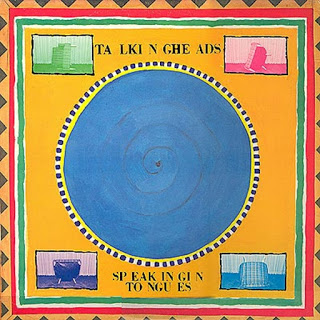
I’ll preface this one with a bold opinion: Speaking in Tongues is not as good as everyone says it is.
Wait, shit, I already made this claim with More Songs About Buildings and Food to much greater effect. Not only that, but More Songs… is a much more controversial album to make such a claim about! Who cares if I say it about Speaking in Tongues, Talking Heads’ fifth studio album and their biggest commercial success to date? No one’s going to argue too vehemently with that, because music trends overtime have proven Talking Heads’ lack of cultural relevance starting around, oh, 1984 after their critically acclaimed concert film Stop Making Sense was released. The problem with Speaking in Tongues, predating the decline, is that it’s the first shift in tone toward funk, soul, and world music, making it naturally the first shift away from art-punk and, more importantly, the first shift away from the full-frontal neurotic overthinking and paranoia we’ve come to know and love from the Heads. So why not judge the album based on its musical merits instead of commenting on the shift and lamenting the final product just because it’s not entirely what’s expected from the band? You got me! But not really. This album is just not interesting enough held up by its own weight to maintain lasting power, IN MY OPINION. I think Speaking in Tongues is packed to the gills with filler and lukewarm musical ideas. I think half of the tracks are overlong and meandering. I think the diversity is lacking in a bigger way than usual. I think that overall, the whole thing is…just ok.
Maybe I’m wrong? Maybe it’s just me? I honestly don’t understand the major mainstream appeal of this record. It’s almost as if everyone bought it to get “Burning Down the House” and “This Must Be the Place (Naive Melody)” in one package (two fantastic songs that bookend the album) and aren’t bothering with the rest? Granted, both those songs were immense hits and “Burning Down the House” was the Heads’ highest charting single, so perhaps the momentum of these two songs really did drive the commercial success of Speaking in Tongues? I really don’t know, but I have a hard time believing that any human being could unconditionally love all nine tracks on here, and that’s coming from a big ol’ David Byrne-fellatin’ fanboy such as myself. Speaking in Tongues and Trues Stories are the two in my collection that get the least amount of spins, no doubt about it. And people HATE True Stories, so that should clearly express how I feel.
That said, I don’t hate Speaking in Tongues. It’s not a bad record. It’s competent and enjoyable enough, it won’t be offensive to your aesthetics, Grandma isn’t going to complain if you’re playing it in the car, it’s aged perfectly fine over the last 35 years, it’s…it’s just ok. I’ll address and expound upon a couple of earlier gripes that might be unfair:
1) overlong and meandering song lengths. It has suddenly come to my attention that my CD version is seven minutes longer than the original LP version, with five out of the nine tracks presented as “extended cuts” and three of these tracks tacking on up to 90 seconds of additional material. I’ve never heard the LP version of the album, but I’d bet both my large dick and my large pussy that “Girlfriend is Better” did NOT need its already-laborious coda drawn out even longer than it already probably was. As it stands, every track between the first and the last breaks the 5-minute mark and a lot of it is unnecessary vamping. I’m sure the LP version would dissolve this perception and I wouldn’t be so harsh, but the CD version is my only frame of reference.
2) lacking diversity. I mean, every Talking Heads album lacks diversity. Between albums, not at all. Within albums, though, hoo boy. This is the Heads’ swampy funk album. Riding off the high of Remain in Light, the band agreed to continue pursuing the afrobeat and deep African funk they had touched upon previously as far back as “I Zimbra” from Fear of Music. For the most part, they play it straight this time. No Brian Eno anymore, so undoubtedly a whole slew of electronic flourishes could’ve been present on the record in an alternate universe where Eno didn’t go on to start producing U2 albums instead. As a result, Speaking in Tongues is less new wave-y than the usual fare but the electronics are still there, albeit toned down. Minimalist songs like “Slippery People” and “Pull Up the Roots” still have their share of synths, but blame the ’80s for that. Otherwise, these are some funky tunes crafted with some deliberate sense of genre authenticity, eschewing the punk attitude almost entirely (at least on a surface level) but leaving a little bit left to give it a small disco dance vibe and still, undeniably, Talking Heads. Can’t fault them too hard on “lacking diversity”; it’s synonymous with “maintaining consistency” and we know the band had been capable of mastering several distinct styles. However, here it all gets a bit similar-sounding in the middle, leaving one’s mind to wander during the rhythmic hypnosis. Repeated listens don’t help a great deal.
3) filler and lukewarm musical ideas. This one is entirely fair, sorry.
Let’s talk about what’s good, though. Byrne is in regular form, still singing in his stilted Talking Heads way and not in his crooning David Byrne-solo career way, but he’s relaxing a bit. He sounds more jaunty and less twitchy. Crazy me, it almost sounds to my ears that he’s having fun! “Burning Down the House” is worthy of its status as one of Talking Heads’ most popular and acclaimed songs. It’s a perfect opener with unparalleled catchiness, and some of the last vestiges of true nervous mania in the Talking Heads catalog can be heard here (vestiges they are, too; this ain’t “Memories Can’t Wait” or “Psycho Killer” anymore). I dare you to get “I’m. Just. An. Or-din-a-ry. Guy./BURNING DOWN THE HOUSE” out of your head. You don’t need me to tell you any of this, you’ve heard the song before already, right? The appeal of “Making Flippy Floppy” is probably due to its position in the tracklist; I don’t believe it would come across as interesting sandwiched between “Swamp” and “Moon Rocks”, but it’s hard not to tap your foot to one of the album’s better beats. The instrumental section is reminiscent of Remain in Light‘s “Houses in Motion” with a little bit more a seductive, dark energy. “Girlfriend is Better” is also a decent tune, long-ass coda notwithstanding, and contains that famous “Stop making sense!” lyric.
After the first three songs you might not find much to get too excited about until “This Must Be the Place (Naive Melody)”, but brilliance and unexpectedness is still peppered throughout if you’re paying enough attention. Usually, you’ll find that the solos during the instrumental passages come with a slightly experimental bent, serving as a respite from the underwhelming and low-energy dance beats. Even Weymouth’s funky bass isn’t able to carry all the burden. “Swamp” is cool enough, though, as an attempt to get that momentum going again with a gritty swagger, some hilarious, unintelligible “old fat black blues guy” muttering at the beginning, and an infectious hook in the chorus (“Hiiiiii/Hi Hi Hi Hi Hi!“…kinda hard to express in writing, I suppose). Other than that, the Heads haven’t given me too much to praise about the other four tracks, which range from lackluster pseudo-gospel (gospel-fusion?) to murky, robotic afrofunk. “This Must Be the Place (Naive Melody)” is likely the first instance of the band creating a genuine emotionally uplifting song without a hint of snark or tension that works very well. Take the opening verse, “Home is where I want to be/Pick me up and turn me around/I feel numb, born with a weak heart/I guess I must be having fun“. Minor-chord that fucker up a little bit and it would be depressing, but the sheer jubilance of the melody keeps it from coming a. Byrne even croons a little!
Speaking in Tongues seems like a deliberate step back from a band who wants to do what they want to do on their own terms and ONLY their own terms, so I can’t give them too much shit for missing the mark when I don’t even believe they were aiming for the mark in the first place. It’s a transition album in terms of creative outlook, but aren’t all the Talking Heads albums like that? Always looking forward and never looking back? In this case, though, the stubbornness of their momentum is probably turning off a lot of old fans who love the Heads for their new wave post-punkiness, and the new wave post-punkiness is waning quickly! Quick, bail now before we get into Little Creatures! You might end up liking it!

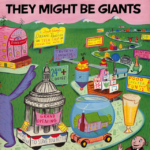

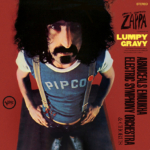
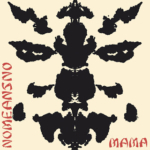
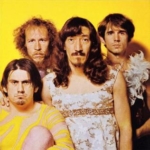
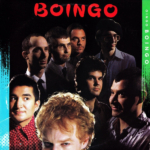
Click here to ridicule this post!